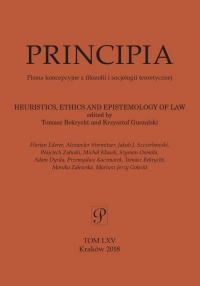Truisms, Heuristics and the Concept of Law
Truisms, Heuristics and the Concept of Law
Author(s): Adam DyrdaSubject(s): Philosophy of Law, Methodology and research technology
Published by: Wydawnictwo Uniwersytetu Jagiellońskiego
Keywords: conceptual analysis; truisms; platitudes; general jurisprudence; heuristics; law; Scott Shapiro;
Summary/Abstract: Analyses of the concept of law rely on certain self-evident truths: truisms (platitudes) about law that people generally share and which reflect their common understanding of this important social concept. General legal theories are products of such analyses. In this paper I argue that every reference to truisms in the context of legal theory building should also take into account inferential processes by which truisms themselves are coined, namely different types of heuristics about law and related phenomena. Since both truisms and heuristics are unstructured, often inconsistent, and even fallible, conceptual analyses are the main means of transforming such “raw” evidence into rationally structured legal theories.
Journal: PRINCIPIA
- Issue Year: 2018
- Issue No: 65
- Page Range: 113-143
- Page Count: 31
- Language: English

